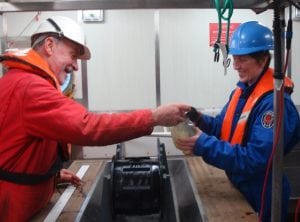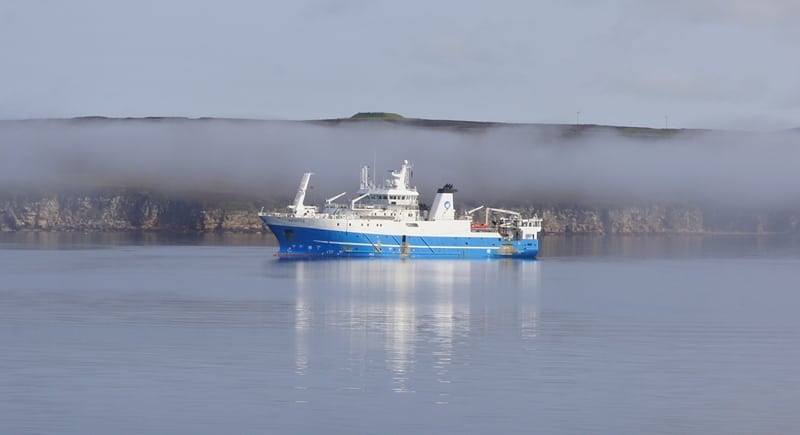Marine
How would you like to be a Scientist-in-Charge?
March 8, 2017 by Marine Directorate Communications No Comments | Category Marine Directorate general, Marine Directorate Science, Marine Directorate Surveys, Oceanography, Research Vessel Surveys
I work as a physical oceanographer for Marine Scotland Science and every December I am also the Scientist-in-Charge (SiC) of the MRV Scotia’s research cruise. Before taking over the December cruise I work-shadowed a colleague who taught me the ins-and-outs of Scotia and this type of cruise. Funnily enough not many people are keen on being out on a research vessel in the North Atlantic in December; let alone being in charge of it.
On that cruise we cover the northern North Sea and the Faeroe-Shetland-Channel, sometimes not the most pleasant place in winter. The weather in December can be variable, anything from calm (getting all the work done in time) to blowing gales most of the time and forcing us to shelter for days (getting no work done).
My official duties as SiC include:
- Working to achieve the scientific objectives (i.e. making decisions about the science);
- Organising science planning meetings beforehand;
- Paperwork (writing the cruise programme and cruise summary report);
- Responsibility for the health and safety of the science crew (i.e. risk assessments, making sure that people get some sleep and don’t work too much);
- Logistics (cabin allocations, watch list, transportation of equipment, containers);
- Visitors (paperwork, training);
- Post-processing and backing up of data; and
- Pre/post cruise meeting with captain and officers.
What this means is that during the cruise I usually meet the captain in the morning to discuss the day’s work, look at the weather forecast, and make decisions about the upcoming work plan. I enjoy knowing what is happening and analysing the different options (well, sometimes there are no options and all we can do is seek shelter in Faeroe, Shetland or Orkney). As SiC I am the point of contact between the science crew and the bridge and basically I am on call for the whole cruise (I get called for any serious problems). I work a normal shift plus then some more, for data processing for example.
 Before and after the cruise there is quite a bit of organising and paperwork involved. While at sea there is the responsibility but also the advantage of knowing what’s going on, having discussions with the captain/crew, and planning each day.
Before and after the cruise there is quite a bit of organising and paperwork involved. While at sea there is the responsibility but also the advantage of knowing what’s going on, having discussions with the captain/crew, and planning each day.
Another task is to keep up morale. In December we miss lots of the festive activities on land so we try to make our own fun and get involved with activities such as our ‘secret Santa’, cookie-eating evening and so on whilst off shift.
The crew on Scotia are predominantly male; something I’ve never really minded. However, on our last cruise we actually had an even male/female split for the science crew. That doesn’t happen often so it was encouraging to see.
My advice would be; if you are female and are thinking about a career in STEM, just go for it! I have had lots of positive experiences by being female and once the crew realises that you know what you are doing you definitely have their respect. I strongly believe that calmness is a superpower. I have been inspired by SiC Humfrey Melling while working onboard a Canadian icebreaker during my PhD who handled his cruises superbly and calmly. Overall I really enjoy being at sea and being SiC on our December Scotia cruises; even though it is a lot of hard work and responsibility.
Dr Berit Rabe
*********************************************
Further information:
- Festive antics on the MRV Scotia – Previous Blog post by Berit Rabe
- Dr Rabe’s biographical information
- Read the details of the Scotia 1816S research survey
- Surveying the Faroe-Shetland channel on You Tube
- Check out other inspirational female oceanographers and their stories
Tags: MRV Scotia, Scotia



Leave a comment